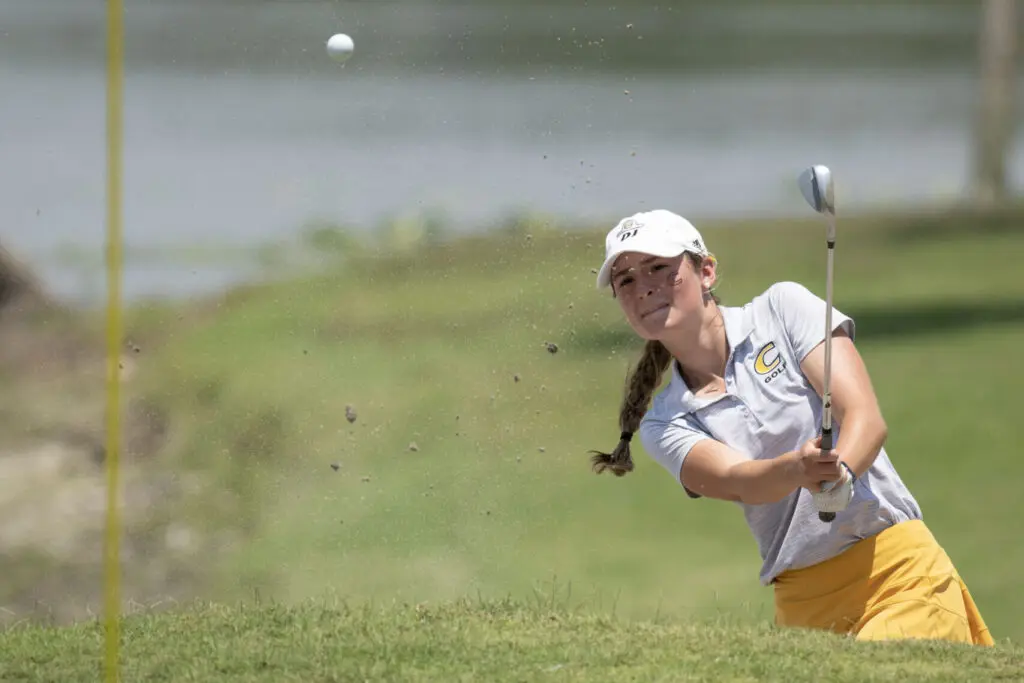Emory women’s golf coach Katie Futcher is still in shock at what unfolded last week at the NCAA Division III women’s golf championship at Mission Inn and Resort’s El Campeon Course in Howey-in-the-Hills, Florida.
“I’ve been around golf my entire life. I played amateur golf, played collegiate golf, played professional golf for nine years on the tour. And I have never heard of or seen a round being canceled because of a poor pin location,” Futcher, who just announced her retirement, told Just Women’s Sports.
A viral video of the third round of competition shows multiple competitors attempting to putt the ball into the sixth hole — only to have it roll back to their feet. After play was paused during the afternoon session due to lightning, the NCAA Division III women’s golf committee decided to scrap all scores from round three, citing the “unplayable” pin at hole six.
“Throughout Round 3 on Thursday, and despite efforts to improve conditions, it became apparent that the pin placement on hole No. 6 … was unplayable,” the committee said in statement provided to GolfChannel.com. “After play was suspended due to lightning late Thursday afternoon, the committee analyzed numerous different options on how to complete the tournament in the time allotted.”
George Fox University went on to win the NCAA team title, while Annie Mascot of Washington University-St. Louis won the individual championship.
Still, the NCAA committee’s decision to cancel the third round — coupled with the pin placement itself — has resulted in social media outrage, questions of sexism and scrutiny over how the championship was organized.
Round 3 of the NCAA D3 Women’s Golf Championship was canceled (with nearly 60% of the field finished) because of this hole location, which the NCAA deemed “unplayable.”
— Brentley Romine (@BrentleyGC) May 12, 2023
Story: https://t.co/lJdUMFYQDc pic.twitter.com/rrsZg2ySIS
In golf, weather delays are common. But when a round is paused and can’t be finished the same day, it is typically completed early the next morning. That very thing happened during the second round of the D3 women’s golf championship. When play was halted during the second round on Wednesday afternoon, players who hadn’t finished resumed play first thing Thursday morning — before beginning Round 3. Futcher says the NCAA committee’s decision to cancel Round 3 after more than 60 percent of competitors had finished in order to prioritize the start of Round 4 is “unheard of.”
While last week’s NCAA women’s golf championship was held at Mission Inn and Resort’s El Campeon Course, it was NCAA rules officials — not the club — who were responsible for setting the course.
“The pin location was absolutely terrible. It should have never happened,” Futcher said. Still, she was shocked when the round was cancelled midway through.
“The thing about golf is, everybody is playing the same pin locations the entire day. Everybody is playing the same golf course,” she explained. “There is an advantage to be playing in the morning, because the green is maybe a little bit more moist. … But the players that teed off in the morning earned the right to have those better conditions because they played better the first few days.”
Jodie Burton, the head coach of the Claremont Mudd Scripps team that finished third, agrees that the pin placement was bad and that teams should have played through it, but appreciated that the head rules official apologized for the mistake.
“He owned the mistake. But it was just a mistake,” Burton said.
Futcher hopes the controversy leads to more accountability and oversight. “I’m sure the rules officials are all terrific, wonderful people. But they are hosting a national championship under the banner of the NCAA, and we have pins, not just on (hole six), that were placed in asinine positions. And I just don’t understand how that could happen.”
The NCAA’s treatment of women’s championships has been under a microscope since 2021, when massive inequities were exposed at that year’s men’s and women’s Division I basketball championships.
Burton doesn’t think sexism played a role here, though. “I don’t what this men’s committee would have come up with, but I don’t think it has anything to do with (sexism) at all. This is the women’s golf championship, and it’s usually wonderful and it still was a wonderful experience,” she said.
Futcher, however, has a hard time imagining that the men’s D3 championship would have featured such terrible pin locations or that the third round would have been handled in the same way. “I find it hard to believe the men would cancel the round or not try to find other solutions,” she said.
For Christel Boeljon, Futcher’s wife and assistant coach, what happened at this year’s national championship is indicative of a larger attitude problem in D3 women’s golf.
“I think that the mentality of Division III women’s golf is almost dumbed down,” Boeljon said. “And I think that’s a shame because all of these girls can seriously play and they work very hard at it.”
Boeljon pointed to the fact that while it is common for athletes in D1 and D2 men’s and women’s golf — and D3 men’s golf — to walk 36 holes in one day, that is a much harder pitch to make for a D3 women’s competition.
While Emory, the defending champion, played a great third round and was arguably put at a disadvantage by the decision to cancel, Futcher believes she would feel just as strongly even if her team hadn’t performed as well in the cancelled round. Emory went on to finish fifth overall.
“I want to state that I could not be more pleased for Mary Jo at George Fox,” she said. “Her team played phenomenal for the three rounds that counted. And she and her team deserve everything that they won and earned this week. … But (the drama) takes away from the team that won.”
She added: “I think the rules officials should be held accountable for the mistake. I think the NCAA committee should be held accountable for their mistake in not overseeing the rules official in terms of the pin placement. I think when you cancel the round, no one gets held accountable.”




